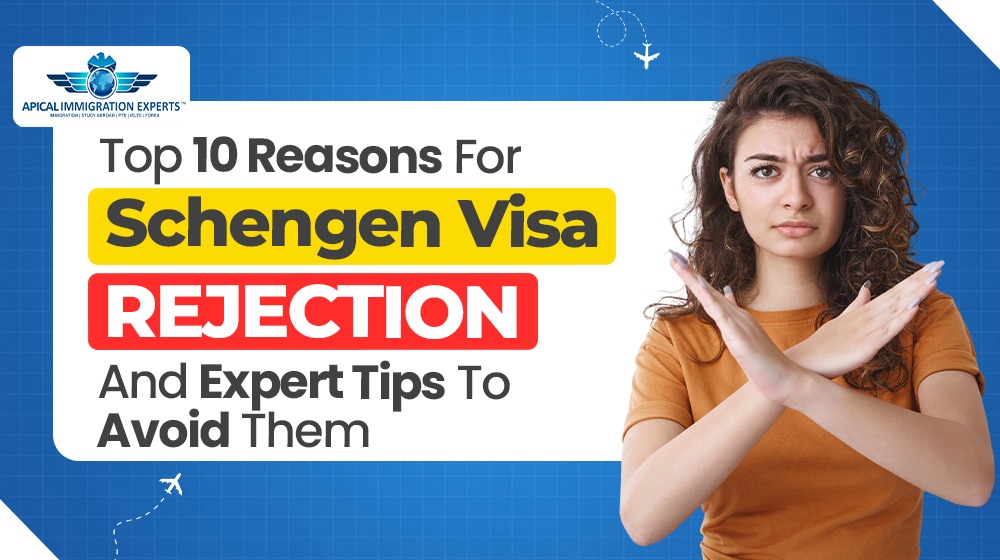Some of the most common reasons for Schengen visa rejections include incorrect or incomplete documentation, false information, insufficient financial funds, lack of valid medical insurance, unclear purpose of visit, and past immigration or criminal history.
According to the latest SchengenVisaInfo statistics, nearly 1.7 million EU visa applications were refused, resulting in an overall Schengen visa rejection rate of 14.56%.
To improve your chances of approval, you must ensure that your application includes all required documentation, valid medical insurance, proof of sufficient funds, and a clear and genuine purpose of travel.
Schengen visa applications are generally refused in accordance with Article 32 of the EU Visa Code (Regulation 810/2009), which outlines the legal grounds for refusal. With a Schengen visa, you can travel to 29 European countries without applying for individual visas.
Before applying, determine the country responsible for your application, book your visa appointment at least 6 months in advance, and ensure you submit your completed application 3–4 weeks before your intended departure.
Planning to apply for a Schengen Visa? Let Apical Immigration Experts guide you through the process with professional documentation support and expert advice.
Top 10 Reasons for Schengen Visa Rejections
-
Forged or False Documentation
Submitting fake or misleading documents — such as falsified bank statements, employment letters, or passports — can lead to immediate rejection under Article 32(1)(a)(i). Providing fraudulent documents may also result in a five-year travel ban or other penalties.
-
Invalid Passport
Your passport must be valid for at least three months beyond your planned stay and should have been issued within the last 10 years. Expired or damaged passports lead to automatic rejection.
-
Unclear Purpose of Travel
Vague reasons like “tourism” or “business” without supporting evidence often result in refusal. You must provide proof such as conference invitations, flight bookings, and hotel reservations that clearly support your reason for travel.
-
Insufficient Financial Proof
Applicants must show they can cover their travel and living expenses. Immigration officers thoroughly verify bank statements, tax documents, employment records, and the authenticity of your funds.
-
Previous Overstay
If you have previously overstayed a Schengen visa (beyond 90 days within 180 days), this may lead to rejection in future applications. Adhering strictly to visa validity is crucial.
-
SIS Alert (Schengen Information System)
A SIS alert means your details are flagged in the European database, usually due to prior immigration or legal issues. If listed, no Schengen visa can be granted.
-
Threat to Public Policy or Security
Applicants with a criminal background, health concerns, or potential security risks may be denied entry under EU regulations.
-
Missing or Invalid Medical Insurance
A valid travel insurance policy worth at least €30,000, covering medical emergencies for the entire Schengen stay, is mandatory. Applications without proper coverage are often rejected.
-
Incorrect or Misleading Information
Providing inaccurate details such as false travel plans, unverified invitations, or inconsistencies in forms can lead to visa refusal.
-
Lack of Intent to Return
One of the most common rejection reasons. If you fail to demonstrate strong ties to your home country — such as employment, family, or property ownership — the embassy may suspect that you intend to overstay.
Tips to Avoid Schengen Visa Rejection
To minimize your chances of rejection, it’s vital to prepare your application carefully and provide transparent, verifiable information.
Here are key steps recommended by Apical Immigration Experts:
- Submit authentic financial proof: Provide clear, verifiable bank statements, salary slips, or sponsorship letters with supporting documentation.
- Show strong home ties: Include evidence of employment, family relationships, or property to demonstrate your intention to return home.
- Provide a clear travel plan: Present a realistic travel itinerary with dates, destinations, bookings, and activities.
- Avoid fake or misleading information: Submit only genuine documents verified by the concerned authorities.
- Obtain valid medical insurance: Make sure your travel insurance covers at least €30,000 and remains valid throughout your stay.
Which Countries Can You Visit with a Schengen Visa?
A Schengen visa allows you to visit 29 European countries, including:
Austria, Belgium, Croatia, Czech Republic, Denmark, Estonia, Finland, France, Germany, Greece, Hungary, Iceland (Non-EU), Italy, Latvia, Liechtenstein (Non-EU), Lithuania, Luxembourg, Malta, Netherlands, Norway (Non-EU), Poland, Portugal, Slovakia, Slovenia, Spain, Sweden, Switzerland (Non-EU), Bulgaria, and Romania.
You may also get visa-free or visa-on-arrival access to certain non-Schengen countries for short visits.
Some of the easiest countries to get a Schengen visa include Luxembourg, Slovakia, Lithuania, Latvia, and Finland.
Expert Assistance with Schengen Visa Applications
Applying for a Schengen visa can be complex, but professional guidance can make the process seamless.
At Apical Immigration Experts, we offer:
- Personalized visa consultation and eligibility assessment
- End-to-end documentation support
- Expert guidance for financial proof and travel itinerary preparation
- Updates on the latest visa regulations
Get step-by-step assistance for your Schengen visa application with Apical Immigration Experts — your trusted partner for overseas travel and immigration success.
- Email: info@immigrationxperts.com
- Call us: +91-9999467686, +91-8447-696555






